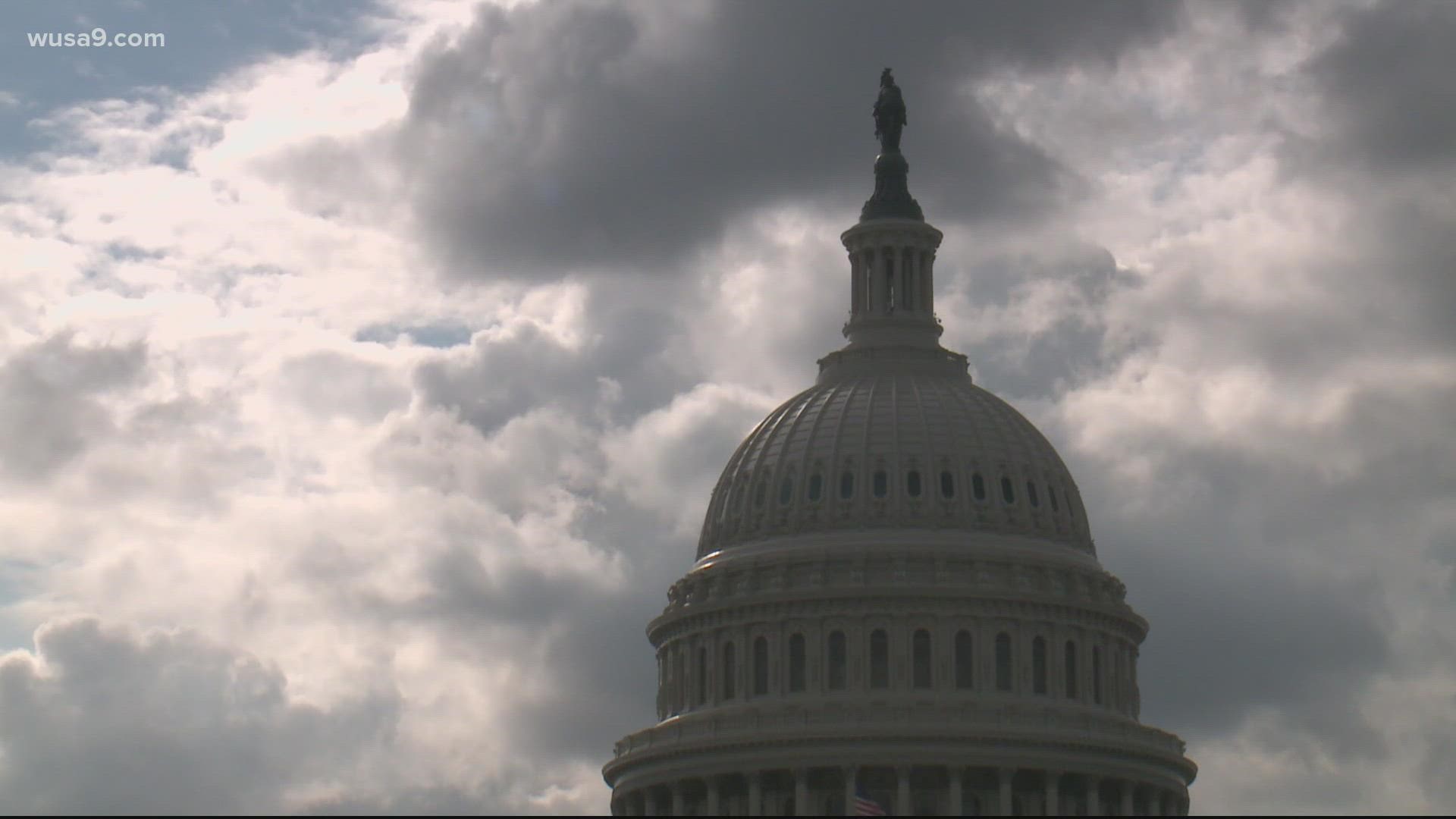WASHINGTON — Democrats and Republicans were able to avoid a government shutdown after a Thursday night vote. However, the two parties have not been able to come to an agreement to raise or suspend the debt limit to avoid a financial crisis.
The Verify team spoke with three experts and combed through Congressional records to break down some of the biggest questions about the debt limit.
SOURCES:
- Dean Baker, Senior Economist at the Center For Economic And Policy Research
- David Wessel, Director of The Hutchins Center on Fiscal and Monetary Policy at the Brookings Institution
- Thomas Kahn, Faculty Fellow at the Center for Congressional and Presidential Studies at American University
- Congressional Research Service, "The Debt Limit"
- Congressional Budget Office, "Federal Debt and the Statutory Limit, July 2021"
- Bipartisan Policy Center, "Recent History of the Debt Limit"
- Congressional Research Service, "The Debt Limit Since 2011"
WHAT IS THE 'DEBT LIMIT'?
The 'debt limit', often referred to as the 'debt ceiling,' is the maximum amount that the Treasury Department is allowed to go into debt.
"The debt limit is the amount of money that the government is allowed to borrow," said Kahn. "Which the government uses to meet existing obligations. It's a statutory limit in law."
Congress decides the spending levels for the federal government, as well as the tax code, meaning they essentially decide if there is going to be a deficit or not. If the debt rises above a certain threshold, Congress must vote to raise the debt ceiling.
"The problem is that when you have a government that is perennially spending more than it takes in in taxes," said Wessel. "It has to keep increasing the amount that it borrows."
The debt limit can also be suspended, which has happened many times in the past, which allows the Treasury to go into deeper debt for a specific time period.
HAVE BOTH PARTIES SUSPENDED THE DEBT LIMIT IN THE PAST?
Yes. According to the Bipartisan Policy Center, the debt limit has been suspended numerous times over the last decade, including three times during the Trump presidency.
- Sept. 8, 2017 - "Weeks away from the Treasury's deadline for Congress to act on the debt limit, President Trump signed a three-month budget and debt limit deal that suspended the limit until Dec. 8, 2017."
- Feb. 9, 2018 - "About a month before Treasury's deadline for Congress to act on the debt limit, President Trump signed a budget deal, negotiated by congressional leaders, that included a one-year suspension of the debt limit."
- Aug. 2, 2019 - "About a month before BPC's estimated date when the U.S. Treasury would be unable to meet all of its obligations, President Trump signed the Bipartisan Budget Act of 2019, which included a two-year suspension of the debt limit."
President Obama also had to deal with debt limit crises when he was in office, according to Bipartisan Policy Center:
- Aug. 2, 2011 - "After months of deadlocked negotiations and only hours before the Treasury Departments deadline for Congress to act on the debt limit, Congress passed and President Obama signed into law the Budget Control Act of 2011, authorizing a two-stage increase of the debt limit to $16.4 trillion."
- Oct. 16, 2013 - "Just a day away from the Treasury's deadline for Congress to act on the debt limit, President Obama signed the Continuing Appropriations Act of 2014. The act suspended the debt limit until Feb. 7, 2014."
"Both parties on a bipartisan basis have voted to increase the debt ceiling," said Kahn. "Because in the past, both parties have recognized that this debt is a bipartisan obligation and responsibility."
Baker said that the process of raising the debt ceiling has become a bigger political fight in recent years.
"As politics has gotten more contentious," he said. "Raising the debt ceiling has become a more contentious issue.
IS BIDEN'S PROPOSED SPENDING THE REASON WE NEED TO RAISE THE DEBT CEILING?
No. According to our experts, the debt ceiling needs to be raised or suspended because of past spending and reductions in revenue.
"The reason the debt ceiling has to be raised is because we are paying the bills for spending and tax cuts that Congress has already approved," said Wessel. "Even if Congress didn't pass one nickel of Joe Biden's agenda, we'd still need to raise the debt ceiling."
Our experts said that it is true that suspending the debt ceiling will allow the treasury to go deeper into debt to cover possible future spending as well.
"We're going to have to continue raising the debt ceiling as we accrue more debt," said Kahn.
IS DEBT ON THE RISE?
Yes. According to the Congressional Budget Office, the deficit for Fiscal Year 2021, which ended on September 30, was expected to be approximately $3 trillion.
The debt has risen drastically over the last four decades, rising from less than $1 trillion in FY 1981 to $26.9 trillion in FY 2020. The GDP has also jumped dramatically over this time period.
"We're here because of old spending under Democrats and Republicans," said Kahn. "And tax cuts under Republicans."
To see a full breakdown of the rising debt, click here.

